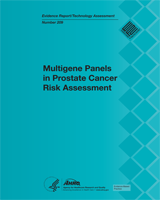This publication is provided for historical reference only and the information may be out of date.
Multigene Panels in Prostate Cancer Risk Assessment
Evidence Reports/Technology Assessments, No. 209
Authors
Investigators: Julian Little, PhD, Brenda Wilson, MBChB, MSc, MRCP (UK), FFPH, Ron Carter, PhD, Kate Walker, MScPT, Pasqualina Santaguida, PhD, Eva Tomiak, MD, Joseph Beyene, PhD, and Parminder Raina, PhD.Affiliations
Structured Abstract
Objectives:
The aim of this review is to identify, synthesize, and appraise the literature on the analytic validity, clinical validity, and clinical utility of commercially available single nucleotide polymorphism (SNP) panel tests for assessing the risk of prostate cancer.
Data Sources:
MEDLINE®, Cochrane CENTRAL, Cochrane Database of Systematic Reviews, and Embase, from the beginning of each database to October 2011. Search strategies used combinations of controlled vocabulary (medical subject headings, keywords) and text words. Grey literature was identified.
Review Methods:
Three Key Questions (KQs) encompassing broad aspects of the analytic validity, clinical validity, and clinical utility of SNP-based panels were developed with the input of a Technical Expert Panel assembled by the Evidence-based Practice Center and approved by the Agency for Healthcare Research and Quality. Standard systematic review methodology was applied, with eligibility criteria developed separately for each KQ.
Results:
From 1,998 unique citations, 14 were retained for data abstraction and quality assessment following title and abstract screening and full text screening. All focused on clinical validity (KQ2), and evaluated 15 individual panels with two to 35 SNPs. All had poor discriminative ability for predicting risk of prostate cancer and/or distinguishing between aggressive and asymptomatic/latent disease. The risk of bias of the studies was determined to be moderate. None of the panels had been evaluated in routine clinical settings.
Conclusions:
The evidence on currently available SNP panels does not permit meaningful assessment of analytic validity. The limited evidence on clinical validity is insufficient to conclude that the panels assessed would perform adequately as screening or risk stratification tests. No evidence is available on the clinical utility of current panels.
Prepared for: Agency for Healthcare Research and Quality, U.S. Department of Health and Human Services1, . Contract No. 290-2007-10060-1 Prepared by: McMaster University Evidence-based Practice Center, Hamilton, ON, Canada
Suggested citation:
Little J, Wilson B, Carter R, Walker K, Santaguida P, Tomiak E, Beyene J, Raina P. Multigene Panels in Prostate Cancer Risk Assessment. Evidence Report No. 209. (Prepared by the McMaster University Evidence-based Practice Center under Contract No. 290-2007-10060-1.) AHRQ Publication No.12-E020-EF. Rockville, MD: Agency for Healthcare Research and Quality. July 2012. www.effectivehealthcare.ahrq.gov/reports/final.cfm.
This report is based on research conducted by the McMaster University Evidence-based Practice Center (EPC) under contract to the Agency for Healthcare Research and Quality (AHRQ), Rockville, MD (Contract No. 290-2007-10060-1). The findings and conclusions in this document are those of the authors, who are responsible for its contents; the findings and conclusions do not necessarily represent the views of AHRQ. Therefore, no statement in this report should be construed as an official position of AHRQ or of the U.S. Department of Health and Human Services.
The information in this report is intended to help health care decisionmakers—patients and clinicians, health system leaders, and policymakers, among others—make well-informed decisions and thereby improve the quality of health care services. This report is not intended to be a substitute for the application of clinical judgment. Anyone who makes decisions concerning the provision of clinical care should consider this report in the same way as any medical reference and in conjunction with all other pertinent information, i.e., in the context of available resources and circumstances presented by individual patients.
This report may be used, in whole or in part, as the basis for development of clinical practice guidelines and other quality enhancement tools, or as a basis for reimbursement and coverage policies. AHRQ or U.S. Department of Health and Human Services endorsement of such derivative products may not be stated or implied.
None of the investigators have any affiliations or financial involvement that conflicts with the material presented in this report.
- 1
540 Gaither Road, Rockville, MD 20850; www
.ahrq.gov
